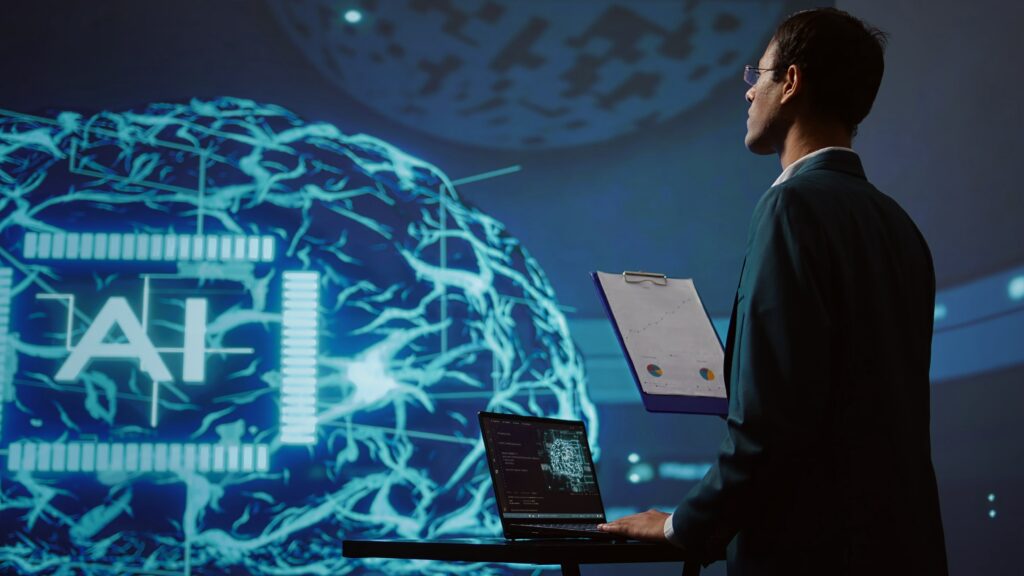August 29, 2025 | Dubai, UAE: A recent report published by LinkedIn reveals that the AI adoption rate in UAE has risen to 80 percent, a significant increase from 56 percent in 2024. This substantial growth emphasizes the country’s role as a frontrunner in digital transformation and ranks it among the leading nations worldwide in terms of AI adoption, surpassed only by India.
The data suggest that AI adoption rate in UAE has emerged as an essential element in the operational framework of workplaces throughout the UAE. Various sectors, including banking, healthcare, logistics, real estate, and retail, are incorporating AI into their daily activities to enhance operational efficiency, decrease costs, and secure a competitive advantage. Professionals employ AI tools for tasks such as data analysis, process automation, customer service, and predictive modeling, thereby rendering AI adoption rate in UAE an integral aspect of contemporary work environments.

AI Adoption Rate in UAE Reaches Record Levels
The adoption of artificial intelligence in the United Arab Emirates is experiencing a rate of growth that surpasses that of many other countries. Analysts identify several factors contributing to AI adoption rate in UAE, including government policies, investments from the private sector, and the adaptability of the workforce.
The National AI Strategy established by the UAE government has significantly expedited this adoption process by emphasizing the importance of artificial intelligence in essential sectors including healthcare, education, and smart infrastructure. Businesses are increasingly incorporating AI-driven solutions to improve productivity, optimize operational processes, and generate new avenues for expansion, further fueling AI adoption rate in UAE.
The LinkedIn report reveals that:
- 77 percent of professionals see AI as a major driver of productivity.
- 81 percent actively engage with AI tools to acquire new skills.
- 73 percent report using AI with greater confidence compared to the previous year.

The workforce’s enthusiasm highlights its readiness to embrace change. Employees are utilizing artificial intelligence to automate repetitive tasks, enhance decision-making, and achieve improved results in their respective roles, showcasing the depth of AI adoption rate in UAE.
In contrast, the report identifies notable challenges associated with this transition. A significant 73 percent of professionals report that learning to use AI tools often feels akin to assuming additional responsibilities, while 61 percent contend that they are not yet fully exploiting the capabilities of AI.
Furthermore, 65 percent acknowledge increased expectations from their employers to innovate through the application of AI. These observations highlight the necessity for structured training programs and continuous support to facilitate the sustainable integration of artificial intelligence into the workplace.
Impact Across Sectors and the Role of Human Interaction
AI’s impact in the UAE extends across multiple sectors. In finance, AI enables fraud detection, risk management, and personalized customer services. In healthcare, it supports diagnostics, predictive analytics, and telemedicine. Logistics companies use AI for route optimization and supply chain efficiency, while real estate firms rely on it for market forecasting and project management. Retailers benefit from AI through demand forecasting, automated customer service, and personalized shopping experiences.

Despite these advancements, human interaction remains essential to professional success. The LinkedIn report shows that 85 percent of professionals still rely on colleagues for insights beyond what AI offers, 82 percent believe personal connections carry more weight than qualifications in hiring decisions, and 74 percent consider networking crucial for career development. Interestingly, 39 percent of professionals say AI tools save them time, allowing for more meaningful collaboration with peers.
Preparing for the Future of Work in the UAE
The United Arab Emirates has established an ambitious objective to emerge as a global leader in artificial intelligence by the year 2031. This goal will be pursued through persistent investments in technological advancements, the creation of innovation hubs, and the promotion of digital education. As the AI adoption rate in UAE accelerates, it will be essential for businesses to achieve a balance between technological progress and the development of human skills. Continuous training, effective management of workplace pressures, and the assurance that artificial intelligence serves to complement human expertise rather than replace it will be vital for achieving sustained success.
The rate of AI adoption rate in UAE illustrates the rapid transformation that technology can instigate within economies and workforces. Currently, 80 percent of professionals in the UAE engage with artificial intelligence on a daily basis, thus establishing a global standard for innovation. The forthcoming challenge consists of sustaining this momentum while providing the necessary support for professionals during this transitional period, ensuring that technology enhances the contributions of human workers instead of diminishing their significance.
Also Read: UAE Electric Vehicle Insurance: Why Drivers Need to Pay Attention as EV Numbers Rise














